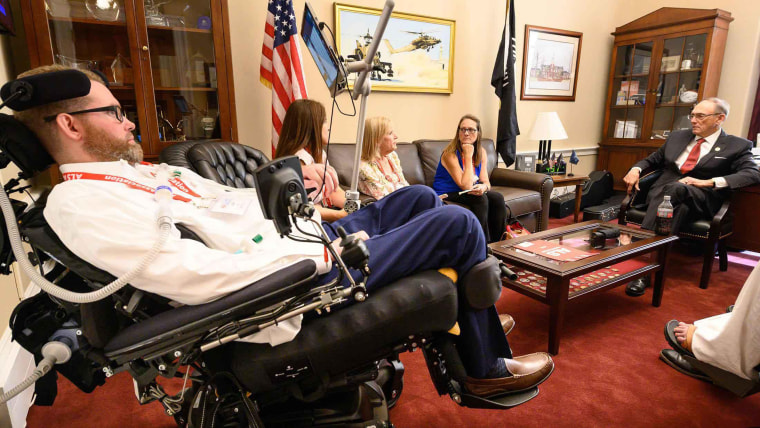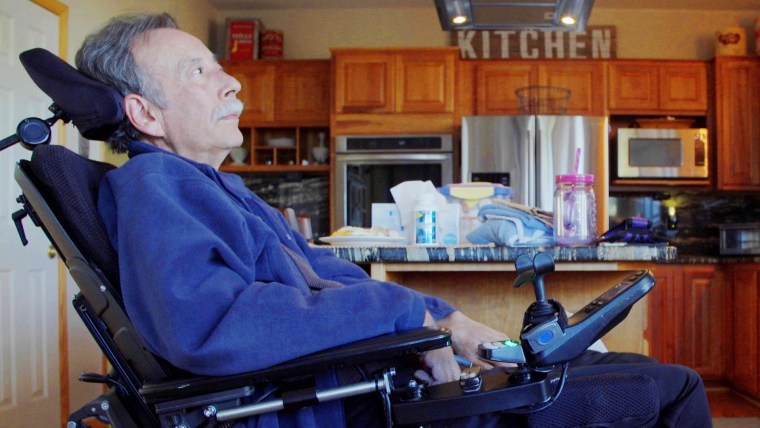Food and Drug Administration advisers are scheduled to vote Wednesday on whether an experimental drug for patients with ALS should receive FDA approval.
The stakes are high for the agency, experts say, as it faces pressure from patients and advocacy groups to approve the drug quickly, saying there is a critical unmet need for patients, but also intense scrutiny from the scientific community over its handling of recent approvals.
ALS, or amyotrophic lateral sclerosis, also known as Lou Gehrig’s disease, is a progressive and fatal neurodegenerative disease for which there is no cure.
The drug, from the Cambridge, Massachusetts-based drugmaker Amylyx Pharmaceuticals, is designed to slow the progression of the disease by preventing cells responsible for carrying signals from the brain to muscle cells from dying prematurely.
But the company is relying on data from just a single clinical trial in its application for approval to the FDA, a decision that has prompted skepticism among some health experts about whether the company has enough evidence to show that the drug works.
Monday, FDA scientists released a critical review of the drug, saying in briefing documents that the company’s data on the drug “may not be sufficiently persuasive” to recommend approval.
April 12, 201915:17
A vote in favor of the drug on Wednesday, from the agency’s Peripheral and Central Nervous System Drugs Advisory Committee, would only be a recommendation, not an official approval. However, the FDA usually follows the advice of its committees.
The FDA’s consideration of the Amylyx drug has been compared by some to how it approached Aduhelm, the Alzheimer’s drug from the drugmaker Biogen. Aduhelm received full approval by the FDA in June, even though the advisory committee voted against its recommendation.
That FDA decision was heavily criticized by outside experts because of the scant data used to demonstrate that it helped patients, and at least three members of the advisory committee resigned in protest after the drug’s approval. The same panel will be reviewing the Amylyx drug.
The agency’s approach to Amylyx’s drug has also been seen as controversial. It initially asked the company last April to complete a larger clinical trial before submitting data on the drug, but after meeting with ALS advocates, it reversed course and allowed the company to file for approval while the additional trial was still ongoing.
Like Biogen’s drug, “it’s a really important case study of what the FDA’s role is when you have patients who say we would be really excited to try this,” said Holly Fernandez Lynch, an assistant professor of medical ethics at the University of Pennsylvania. “Should the FDA be willing to approve it, recognizing that’s going to sacrifice some certainty?”
The drug’s potential approval has been met with great anticipation from patients and advocacy groups, such as I AM ALS and the ALS Association, which funded a portion of Amylyx’s study in part using funds from 2014’s viral Ice Bucket Challenge.
If the FDA grants approval, advocacy groups say it would represent a major advancement for the roughly 30,000 people in the United States with ALS.
Most people are diagnosed with ALS in their 40s to mid-60s and the average life expectancy after diagnosis is two to five years. The progression of the disease can vary in people, but symptoms can often begin in the hands, arms, legs or feet before slowly destroying cells needed to control speech and swallowing, according to the Mayo Clinic.
 ALS Association representatives meet with Rep. Phil Roe, R-Tenn., right, in his office in this undated image. (Roe left Congress in 2020.)Kevin Allen / The ALS Association via AP
ALS Association representatives meet with Rep. Phil Roe, R-Tenn., right, in his office in this undated image. (Roe left Congress in 2020.)Kevin Allen / The ALS Association via AP
There are a handful of drugs approved by the FDA for the disease and its symptoms; one has been shown to extend the lives of patients by about three months.
According to Amylyx, in a Phase 2 clinical trial of 137 patients, people who took the drug lived about six months longer than those who received a placebo.
A follow-up analysis of the results, which tracked the participants for three years, also showed that the drug reduced the risk of death by 44 percent in that time period. The reported rates of side effects in people who received the drug were similar to those who got the placebo, with the exception of diarrhea in the drug group.
FDA scientists, however, appeared skeptical about the benefits of the drug, saying in the briefing documents that the results of Amylyx’s trial were “not robust.”
The agency scientists also appeared to take issue with the company’s decision to use just a single study in their application for approval.
Under certain circumstances, a single study may be sufficient to establish a drug’s effectiveness, but Amylyx’s “may not be adequate,” the FDA wrote. The agency had also “strongly suggested” that the company complete a Phase 3 trial to determine the effectiveness of the drug, according to the documents.
Amylyx declined to comment for this article, citing the ongoing regulatory review.
Dr. Stephen Scelsa, a neurologist at Mount Sinai Hospital in New York City, said he thinks that the drug shows promise, but would still like to see more data. Mount Sinai was one of the trial sites for the drug, and Scelsa was involved with the trial.
It’s possible, he said, that a Phase 3 trial could reveal the drug doesn’t work as expected, even though the Phase 2 trial showed there was an apparent benefit.
“I think this will probably pan out and show an effect, but as a scientist, I’d like to see Phase 3 data,” Scelsa said.
If the FDA approves the drug before the additional trial is completed, it could make it more difficult to recruit people for the study because the drug is already available for those who want it, he added.
Lynch, of the University of Pennsylvania, said that after reading the FDA documents, a “flat out rejection” of the drug by the agency “would surprise me less than I was predicting last week.”
“FDA has raised some pretty serious concerns,” she said, adding that the agency is now in an “awful position.”
“The options here are all less than ideal,” she said. “If the drug doesn’t work, approving it is obviously problematic. If it does work, not approving it is also problematic — even more so, I think.”
The agency noted in the documents Monday that it has “regulatory flexibility” to approve drugs for “serious disease with unmet medical needs.”
There may be hope for the drug — it’s still unclear how much sway advocacy groups and patients will have on the agency’s decision during the public comment period Wednesday.
Brian Frederick, a spokesperson for the ALS Association, highlighted the high interest in the drug, pointing NBC News to a petition signed by 50,000 people calling on the FDA to approve the drug as quickly as possible.
Follow NBC HEALTH on Twitter & Facebook.

